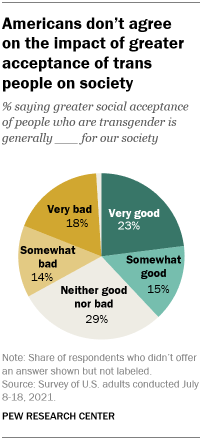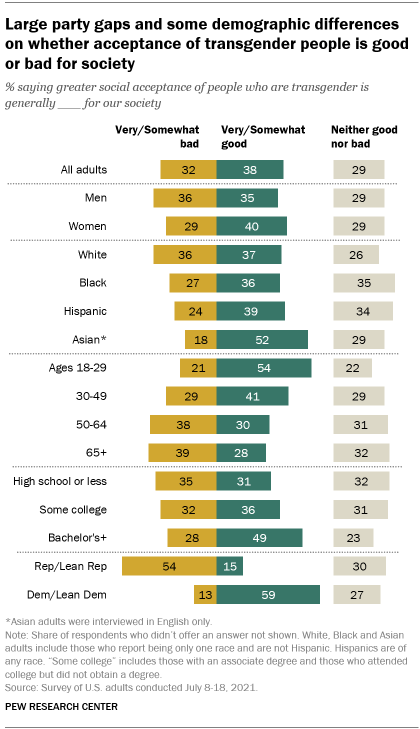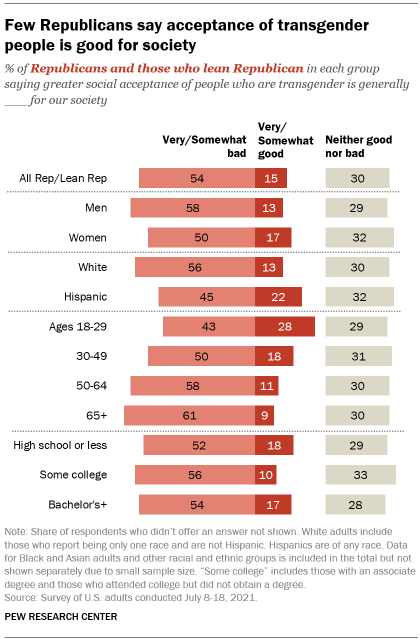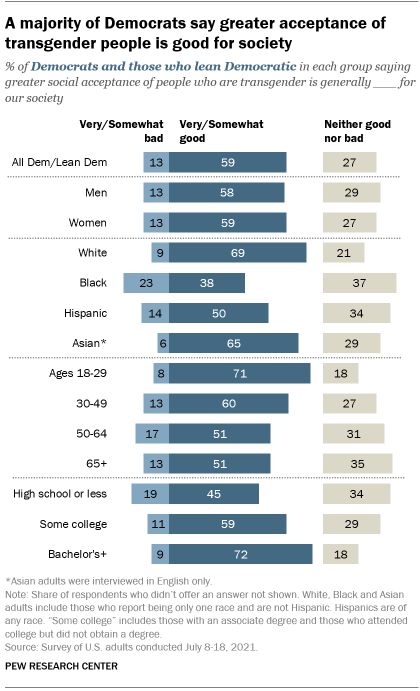At a time when a rising share of U.S. adults say they know someone who is transgender, there is no public consensus on whether greater social acceptance of transgender people is good or bad for society, according to a Pew Research Center survey conducted last July.
The question was asked as part of a broader survey that asked about the public’s views on a wide range of social and political issues, including whether different societal trends in the U.S. are generally good or bad for society.
About four-in-ten U.S. adults (38%) say that greater acceptance of people who are transgender is generally good for our society, while 32% say it is bad and 29% say it is neither good nor bad. There is a stark difference between Republicans and Democrats on this topic, and views also vary among some key demographic groups, including groups within each party.
A majority of Democrats and those who lean toward the Democratic Party (59%) say that the greater acceptance of transgender people is good for society, while a majority of Republicans and Republican leaners (54%) say it is bad for society. Republicans are also slightly more likely than Democrats to say it’s neither good nor bad.
By ideology, the differences are even more dramatic. Three-quarters of liberal Democrats say greater acceptance of transgender people has been good for society. This compares with 45% of moderate or conservative Democrats, 27% of moderate or liberal Republicans and just 8% of conservative Republicans. Meanwhile, 65% of conservative Republicans say acceptance of trans people has been bad for society, while just 6% of liberal Democrats say the same.
This analysis focuses on one question that was part of a longer battery of items looking at how the public assesses a variety of societal trends. This particular item sought to gauge whether Americans see the trend of greater social acceptance of transgender people as good or bad for society. To do this, we surveyed 10,221 U.S. adults from July 8 to 18, 2021. Everyone who took part is a member of Pew Research Center’s American Trends Panel (ATP), an online survey panel that is recruited through national, random sampling of residential addresses. This way nearly all U.S. adults have a chance of selection. The survey is weighted to be representative of the U.S. adult population by gender, race, ethnicity, partisan affiliation, education and other categories. Read more about the ATP’s methodology.
Here are the questions used for the report, along with responses, and its methodology.
This partisan gap is consistent with other findings on how the public views transgender people. For example, a 2017 survey showed that 64% of Democrats believed that whether a person is a man or a woman can be different from sex at birth, while 80% of Republicans believed just the opposite – that gender is determined by sex at birth.
Younger adults, Asian Americans, those with a bachelor’s degree or more education and women tend to be more likely to say social acceptance of transgender people is good for society. On the other side, White adults, older people, those without a bachelor’s degree and men tend to be more likely to say greater acceptance is bad for society.
Many of these differences remain, or become even more pronounced, within each party. Republicans and GOP leaners in all major demographic groups tend more toward saying greater social acceptance of transgender people has been bad, rather than good, but certain groups are more likely to say this than others. A majority of Republicans 50 and older see this as bad for society, while roughly half of those younger than 50 say the same. Meanwhile, about three-in-ten Republican adults younger than 30 say greater acceptance of people who are transgender is good for society, larger than the shares in older age groups who say the same.
Republican men are more likely than Republican women to say greater acceptance of trans people is bad for society, and White Republicans are more likely than Hispanic Republicans to say the same. (The sample sizes of Black and Asian Republicans are not big enough to analyze separately.)
White evangelical Protestant Republicans are significantly more likely to say more social acceptance of trans people is bad for society (71%) compared with White non-evangelical Protestant Republicans (48%) or White Catholic Republicans (51%).
Republicans who know a transgender person are less likely than those who don’t to say greater acceptance of people who are transgender is bad for society (45% of those who know a trans person, vs. 60% of those who do not), and they are more likely to say it’s good or neither good nor bad. Still, a plurality of those who know someone who is trans say more acceptance is bad for society: 45% say this, while 37% say it is neither good nor bad and 18% say it is good.
Democrats are just about the mirror opposite of Republicans. A majority – including similar shares of men and women – say greater acceptance of people who are transgender is generally a good thing. Just as among Republicans, younger Democrats skew more positive on this issue, with 71% of 18- to 29-year-olds saying they think this is good for society, compared with six-in-ten of those ages 30 to 49 and about half of those 50 and older. Still, relatively small shares of Democrats across age groups say greater acceptance of people who are transgender is bad for society.
About seven-in-ten Democrats with at least a bachelor’s degree say acceptance of trans people has been good for society, compared with about six-in-ten of those with some college experience and fewer than half of those with a high school diploma or less.
Among Democrats, there is an interesting pattern by race and ethnicity. Even though White adults overall are more likely than Black, Hispanic and Asian adults to say greater acceptance of transgender people is bad for society, this is quite different among Democrats. White Democrats, along with Asian Democrats, stand out as being most likely to say this is good for society.
As is the case among Republicans, White evangelical Protestant Democrats – while leaning more toward saying it’s good for society than saying it’s bad – tend to be more negative about the greater acceptance of trans people (28% say it’s bad for society) than their White non-evangelical Protestant (10%) and White Catholic (13%) counterparts.
Democrats who know a trans person are more likely to say greater social acceptance is good (69% vs. 50% of those who do not know a trans person) and less likely to say it’s bad (10% vs. 16%) or neither good nor bad (21% vs. 33%).
Note: Here are the questions used for the report, along with responses, and its methodology.




